|
|
|
Sort Order |
|
|
|
Items / Page
|
|
|
|
|
|
|
| Srl | Item |
| 1 |
ID:
157876
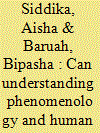

|
|
|
|
|
| Summary/Abstract |
We draw on scholarly literature on the phenomenology of power and disability to understand both the impact of acid violence upon survivors’ lives and the motivations of perpetrators. We employ a human capabilities approach, espoused by prominent development theorists such as Amartya Sen and Martha Nussbaum, to propose policy responses and support systems based not solely on the provision of financial and material resources, but also on improving the social position of acid violence survivors. We show how engaging simultaneously with these frameworks will help move the political and philosophical discourse on acid violence forward and also enable us to frame more responsive and enabling policies to support survivors.
|
|
|
|
|
|
|
|
|
|
|
|
|
|
|
|
| 2 |
ID:
157871
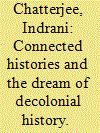

|
|
|
|
|
| Summary/Abstract |
This essay argues that historians in post-colonial nation-states and spaces cannot offer connected histories across spaces shaped by war and the partitions of the nineteenth and twentieth centuries. It provides examples of these hurdles from a space called ‘Assam’ in the nineteenth- and twentieth-century colonial archive. Native scribes collaborated with colonial Britons in writing accounts that set up spaces as culturally separate and disconnected from erstwhile hegemons. The essay concludes that connected histories of pre-colonial pasts remain a dream in a post-colonial context shaped by global and local investments in mythologised spaces, governing ideals and culturally separatist institutions.
|
|
|
|
|
|
|
|
|
|
|
|
|
|
|
|
| 3 |
ID:
157879
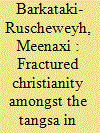

|
|
|
|
|
| Summary/Abstract |
This paper examines the proliferation of Christian denominations among the small Tangsa community in Northeast India. While resentment over the language chosen by the Baptist Church for the official Tangsa Bible triggered the initial fissures, the recent arrival of Pentecostal and charismatic churches has brought about further divisions. These divisions have not helped the cause of pan-Tangsa unity. However, in the everyday lives of most Tangsa, it is the Christian/non-Christian divide that is more relevant. Hence, the Tangsa situation is different from that of the neighbouring Mizo and Naga communities, in which Christianity has become a defining part of their identities.
|
|
|
|
|
|
|
|
|
|
|
|
|
|
|
|
| 4 |
ID:
157875
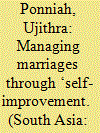

|
|
|
|
|
| Summary/Abstract |
There has been a rise in the availability and consumption of ‘New Age’ spiritualities in urban India. I focus on one such self-care practice, Reiki, in a heterogeneous Delhi neighbourhood, and the engagement of urban upper-caste women from middle-class joint families with it. I argue that Reiki classes can be read as a site for the formation of gendered subjectivities. There are four kinds of interpersonal problems women discussed in Reiki classes: one's well-being in families, divorces, problems with mothers-in-law and material success. Through the habitualisation of positive thoughts, maintaining cosmic balance and managing one's ‘life-energy’, women were taught to take control of their lives within the constraints of familial situations. Through a focus on the self, these practices re-teach women to adapt happily by visualising the intimacies they desire, articulating their anxieties and imagining newer ways of ‘doing’ marriage. I argue that practices like Reiki disempower women through a language of self-responsibilisation. Self-healing strategies like Reiki therefore function both as a ‘technology of the self’ and as an extension of the adaptable Hindu joint family.
|
|
|
|
|
|
|
|
|
|
|
|
|
|
|
|
| 5 |
ID:
157869
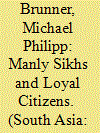

|
|
|
|
|
| Summary/Abstract |
This article looks at Khalsa College, the first college specifically aimed at the Sikh community in late colonial India, and its schemes for and ideals of physical culture. Despite Sikh communal and Indian national aspirations, as well as a robust transnational discourse on ‘scientific’ physical culture that was being increasingly articulated in the inter-war period, Khalsa College remained remarkably devoted to ‘modernised’ physical exercise schemes focusing on British ‘manly games’ such as football, hockey and cricket. The essay locates the reasons behind the college management's staunch loyalty to Britain and opposition to newer, radical Sikh politics; its use of images of Sikh military traditions and ‘martial manliness’, often used to demarcate Sikhism from an ‘effeminate’ Hinduism; and its specific interest—shared by the colonial authorities—in keeping the students fit for military service.
|
|
|
|
|
|
|
|
|
|
|
|
|
|
|
|
| 6 |
ID:
157867


|
|
|
|
|
| Summary/Abstract |
Mimesis is a key theme in scholarly discussions of conventions of representation. The crucial role mimesis plays in behaviour formation has been noted by European theorists such as Theodor Adorno, Walter Benjamin and Reinhart Koselleck. However, in post-colonial discussions of historiography, mimesis rarely appears as a concept deserving of sustained scholarly attention. Addressing this lacuna, I discuss here mimeticist aspects of anti-colonial historiography. For this purpose, I analyse the historiographical agenda of the Hindu nationalist author, Bankimchandra Chattopadhyay (1838–94). I demonstrate that as Chattopadhyay attempted to promote a mimetic relationship with the pre-colonial past, he also undermined, at times, the nineteenth-century principles of factual history.
|
|
|
|
|
|
|
|
|
|
|
|
|
|
|
|
| 7 |
ID:
157870
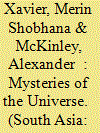

|
|
|
|
|
| Summary/Abstract |
This article analyses M.C. Siddi Lebbe's (d. 1898) Sufi treatise, Asrarul Alam (Mysteries of the Universe), with attention to the literary networks operating among late nineteenth-century South Asian Muslims. The diversity of Lebbe's source material and complexity of his argumentation signal his broad engagement with Islamic thought old and new, foreign and local, Arabic and Tamil. Furthermore, Lebbe cast his literary network especially wide, incorporating non-Islamic ideas like theosophy and yoga from Euro-American and Indic sources as foils for the explication of Sufism. This philosophical mosaic in turn sparked debate among Muslim scholars. Asrarul Alam became an impetus for identity definition in a controversy that involved high stakes in translation choices and the unique complexities of works by a trilingual author such as Lebbe.
|
|
|
|
|
|
|
|
|
|
|
|
|
|
|
|
| 8 |
ID:
157877


|
|
|
|
|
| Summary/Abstract |
This essay demonstrates how public wall art on Tulsi Pipe Road in Mumbai relates to and with its everyday gazers. Through public wall art, Tulsi Pipe Road is readily transformed into a repository of post-millennial societal memory as the white paint is subsumed time and again by colours, bold images and social messaging in English, Hindi and Marathi. The images are transitory, not least because of regular whitewashing by the municipality, a performative and curious mixture of ‘uniform’ beautification, but, equally, a censorship of sorts, for the white tableau of Tulsi Pipe Road calls the people of Mumbai to action. Based on fieldwork from early 2016, this essay explores how wall art interacts with passers-by through social messaging, drawing on recent social memory and calling people to movement. Analysing a recently-installed mural in homage to the late Abdul Kalam and a collection of three panel murals that explore post-millennial experiences of being a woman in India, the essay posits that darśan, a mode of seeing usually enacted in sacred realms, is conceivably being invited in non-dharmic and, moreover, apparently ‘secular’ forms of ‘seeing’. The essay suggests that darśan is at play in the consumption of the public wall art of Tulsi Pipe Road, and thus explores the implications of how established (Hindu) Indian aesthetics of visuality are shaping the ways in which we see (in) New India.
|
|
|
|
|
|
|
|
|
|
|
|
|
|
|
|
| 9 |
ID:
157878


|
|
|
|
|
| Summary/Abstract |
This paper demonstrates a case of state formation in South Asia that emerged from below. In India, the state of Maharashtra has had a history of social movements by people evicted by dam construction dating back to the 1920s. The cumulative effect of these movements led Maharashtra to enact a law in 1976 to empower dam evictees, thus establishing the first rehabilitation law in India. These movements democratised the state and transformed its legal arena through a rights-based, claim-making approach. I argue that in post-colonial India, the state and society co-evolved through dialectics that were instrumental in transforming both, and that the making of the Maharashtra Resettlement of Project Displaced Persons Act, 1976, was the precursor to all acts subsequently passed in India in response to a rights-based, claim-making approach.
|
|
|
|
|
|
|
|
|
|
|
|
|
|
|
|
| 10 |
ID:
157872


|
|
|
|
|
| Summary/Abstract |
Using Said's contrapuntal analysis, this paper places Prashad's Uncle Swami: South Asians in America Today (2012) in a dialectic with Said's Orientalism (1978) to explore contemporary conceptualisations, racialisations and positionings of South Asians in the United States. The investigation specifies the enduring and expanding nature of Orientalisms, using Marxist political economy analyses and post-colonial positionings to gain insights into the specifically hybridised identities of South Asians in America. It links the expansion of Orientalisms to contemporary US imperial projects with South Asians’ conceptualisations and racialisations located within the amalgam of expanding global capitalism and narratives of security.
|
|
|
|
|
|
|
|
|
|
|
|
|
|
|
|
| 11 |
ID:
157873


|
|
|
|
|
| Summary/Abstract |
Recent scholarship has pointed to a new obsession in the male-dominated Bollywood industry—of engaging with the status of the urban, middle-class, post-colonial woman. Using the example of the 2014 film Queen, I discuss this recent trend towards ostensible female empowerment. In the film, the main character, Rani, is a middle-class woman seeking freedom from tradition—from man and marriage—by going on her honeymoon alone. As she plays the tourist in Europe, the viewer is led to believe that she has come into her own, finding her self and her purpose. I argue against this reading, contending instead that constructing Rani's empowerment abroad is in fact a medium for re-conceptualising private and public spheres and reinstitutionalising indigenous patriarchies transnationally, for even abroad Rani is not free. She is both an agent for and a victim of reconstituting middle-class, nationalist ideologies. For this reason alone, the film is about subjection rather than empowerment.
|
|
|
|
|
|
|
|
|
|
|
|
|
|
|
|
| 12 |
ID:
157868
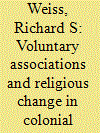

|
|
|
|
|
| Summary/Abstract |
This article examines the impact of Western discourses of religion and community on Tamil Shaivism in the 1860s and 1870s. I focus on Ramalinga Adigal, one of the most important and innovative Tamil Shaiva leaders of the time. In 1865, Ramalinga founded a new society that incorporated features of Western associational culture, including an emphasis on individual ethical transformation, social activism, charitable outreach and voluntary association. Yet, at the same time, he drew on Shaiva devotional and Tantric traditions. I conclude that the impact of Western conceptions of religion was gradual and uneven, especially on the margins of colonial cosmopolitanism.
|
|
|
|
|
|
|
|
|
|
|
|
|
|
|
|
| 13 |
ID:
157874
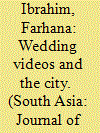

|
|
|
|
|
| Summary/Abstract |
An ethnographic illustration of post-disaster resettlement among Muslims in western Gujarat suggests that ‘moving on’ from the loss of home is a social rather than a state-directed process and that social intimacy is not necessarily produced in enclaves of religious sameness. Wedding videos filmed on the street in pre-earthquake times are not just representations of a past, but also affective and material modes of producing a community in resettlement. While resettlement has apparently led to ghettoisation and peripheralisation of the city's Muslims regardless of class, the paper argues that wedding videos are a mode of transcending such spatialisation and constitute visual and affective claims to the city in the context of post-disaster reorganisation of urban space.
|
|
|
|
|
|
|
|
|
|
|
|
|
|
|
|
|
|
|
|
|